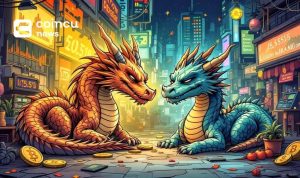Proof-of-Replication (PoRep) is a concept that is commonly associated with Filecoin and other blockchain networks. It plays a crucial role in ensuring the integrity and availability of stored data within a decentralized storage system. In this article, we will explore the intricacies of PoRep and its significance in the world of blockchain.
What is Understanding Proof-of-Replication?
Proof-of-Replication involves storage miners demonstrating to the network that they possess a completely unique copy of a specific data piece stored for the network. This process serves as a proof-of-retrievability mechanism within a proof-of-space framework.
Imagine a scenario where you are a storage miner participating in the Filecoin network. You want to provide storage space to the network and earn rewards in return. To do so, you need to prove that you are storing replicas of data in a unique and retrievable manner.
Proof-of-replication ensures that the stored data can be easily accessed or “retrieved.” It verifies that the data replicas stored by the miners are genuine and not tampered with. This is crucial in decentralized storage systems where trust and data integrity are paramount.
What is Proof-of-Replication?
Proof-of-Replication involves a two-step process: replication and verification.
During the replication phase, the storage miner creates multiple copies of the data piece that they intend to store. These copies are stored on different physical storage devices, ensuring redundancy and data availability even in the event of failures.
Once the replication is complete, the storage miner needs to prove that the replicas are indeed unique and retrievable. This is where the verification phase comes into play. The miner generates a proof, commonly referred to as a “proof-of-replication,” to demonstrate that they have successfully replicated the data as required by the network.
This proof is then submitted to the blockchain network for validation. The network, consisting of other participants known as validators, verifies the proof to ensure its legitimacy. If the proof is valid, the storage miner is rewarded for their contribution to the network.
What are the benefits and limitations of Proof-of-Replication?
Proof-of-Replication brings several benefits to decentralized storage systems:
- Data Integrity: PoRep ensures that the stored data is genuine and has not been tampered with. This is achieved through the verification process where the replicas are validated against the original data.
- Redundancy and Availability: The replication phase ensures that multiple copies of the data are stored on different storage devices. This redundancy enhances data availability, reducing the risk of data loss.
- Security and Trust: PoRep adds an additional layer of security to the storage system. By validating the uniqueness of the replicas, it mitigates the risk of malicious actors trying to manipulate the stored data.
- Efficient Resource Utilization: Proof-of-Replication enables storage miners to efficiently utilize their storage capacity. By storing unique replicas, they contribute to the network’s storage needs and are rewarded accordingly.
However, it is important to acknowledge the limitations of Proof-of-Replication:
Bandwidth Consumption: Critics argue that PoRep systems overlook the bandwidth consumed when transferring replicated data to new nodes added to the redundancy pool. As the network grows, the transfer process can potentially consume significant bandwidth, impacting the scalability of the system.
What are the real-world examples?
Proof-of-Replication is a crucial component of many decentralized storage networks, with Filecoin being a prominent example.
Filecoin is a blockchain-based storage network that incentivizes participants to provide storage space. Miners in the Filecoin network replicate and store data using PoRep, ensuring data integrity and availability. The unique proof generated by the miners serves as evidence of their contribution, and they are rewarded with Filecoin tokens.
Another example is the Storj network, which utilizes Proof-of-Replication to ensure the durability and retrievability of stored data. Storj is a decentralized cloud storage platform where users can rent their unused storage space to the network. PoRep plays a critical role in verifying the validity of the stored data and rewarding the storage providers.
What is in conclusion?
Proof-of-Replication is an essential concept in the world of blockchain and decentralized storage systems. It ensures data integrity, availability, and security, while also incentivizing participants to contribute their storage resources to the network. While there are limitations to consider, PoRep remains a fundamental building block in the quest for decentralized and secure storage solutions.














